
“It’s only financially, that’s my only motivation here. It’s like, you know, look, I’ll make you look good, just keep paying me. That’s easy.”
These are not lines from a shadowy scene in The Godfather, Goodfellas, or some other fictional mobster movie.
Rather, this is a direct quote from real-life PBS Frontline editor Steve Audette, in a presentation to a live audience in a Boston auditorium, as he describes how Frontline documentaries are made.
Audette tells the crowd, just before he shows them how he shortens a clip and covers up (in editing) an apparent factual error made by political pollster Frank Luntz in an interview for the 2017 Frontline documentary, “Trump’s Road to the White House”:
“As an editor, your job is to fix this stuff and to make them [certain interviewees, in this case, Luntz] look great, because if they look great, they hire you back. Right? It’s only financially, that’s my only motivation here. It’s like, you know, look, I’ll make you look good, just keep paying me. That’s easy.”


Later in the presentation, Audette reviews for the audience a portion of the same documentary, in which he shows clips of Donald Trump dispatching competitors onstage in the 2016 Republican primary debates, followed by an edited transition from a black-and-white still photo of Trump to moving footage of an amped-up shirtless and tattooed man in the street who shouts obscenities. He yells about cooking burritos, making tortillas, and building the southern border wall—before bellowing, “I love Trump!”

Audette explained that he was using the shocking footage of the shouting man as a stand-in for what Audette falsely claimed Donald Trump represents. The same ugly footage of this man in the street, who presumably was not given an opportunity to pay Audette to make him “look good,” has been used in multiple Frontline documentaries in which Audette is credited as the editor.
Why? Extreme bias. For the purpose of painting Trump supporters with a negative brush.
Aside from illicit payments—explicitly cited by Audette—from certain interviewees, PBS Frontline is officially funded with taxpayer money through the Corporation for Public Broadcasting.
As Audette explains:
“So, what we did is, right at the peak of when [Trump’s] theatrics is actually entertaining—you’re actually laughing at this ridiculousness of him taking down the other candidates—we take this turn. And once again we take it through, first, a black-and-white photograph [of Trump]. And that’s an attempt to kind of remove yourself from [Trump] as a live character to [Trump] and what he represents…Then we go into the darker side of Trump.”
The video of Audette’s hourlong presentation, made in March 2017, is posted to YouTube with a title that begins, “Documentary Editing Masterclass with Editor Steve Audette.”
I happened upon this video in August, when the recently retired Audette followed me on Twitter/X, shortly after I had addressed a tweet to writer and former Democrat Sasha Stone.
Audette’s Frontline credits go back to at least 1993 and end in 2022, with titles including “Trump’s American Carnage” and “American Insurrection,” among other documentaries that attempt to smear Trump and his supporters.
Sasha Stone, who was once a public supporter of Hillary Clinton and Joe Biden, writes a popular Substack publication about how she “escaped the bubble to get to know the other side of the country and take a more critical look at the Left.” Stone’s pieces include, among others, “Did I Just Leave A Cult,” “How Joe Biden Lost My Vote,” and “How I Knew The Democrats and The Media Were Lying About January 6th.”
My tweet to Stone in late August was a follow-up to an appreciative Twitter post I had made in July citing her piece, “The Day Journalism Died.” In the piece, Stone writes of establishment media and PBS Frontline:
“They took Trump’s comments out of context, as they routinely did, and then carried it all the way to January 6th to paint a picture of who [Trump supporters] are and what they wanted when they protested the 2020 election, which was their right as American citizens.
Is no one going to sue all of them for these blatant lies which really do meet the definition of defamation?
PBS paints them as frothing angry brown shirts in this supposed ‘story’ on the supposed ‘insurrection.’ This is the news source I used to believe in. I used to put my full and complete trust in PBS and Frontline. Now that I see what they really are, what they have become, what else can I do but mourn the loss of journalism as we once knew it?
I would never have known the truth about Trump or his supporters had I not taken the time to escape my own ideological bubble and get to know them for myself.”
Notably, the Frontline documentary that Stone specifically references, in the preceding excerpt of her piece, as painting Trump supporters with a defamatory brush is “American Insurrection,” which credits Steve Audette as an editor.
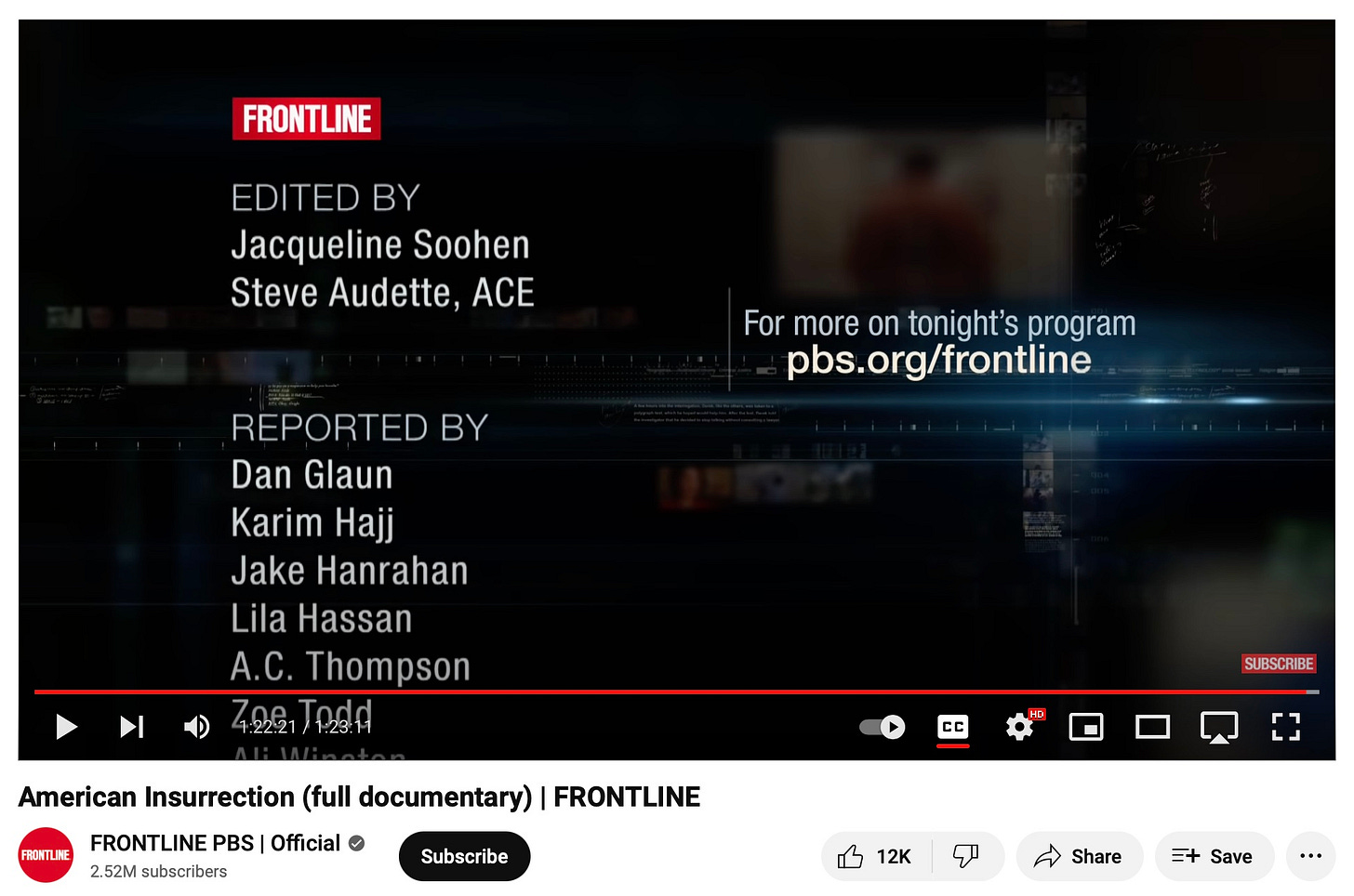
After Audette followed me, I reviewed his Twitter bio, in which he writes that he was a “30 years editor on the PBS series FRONTLINE” who is “currently retired sailing off the east coast with my bride cruising.” This self-description is followed by a link to the video of his “masterclass” presentation. I watched the video in full, somewhat surprised to find that Audette’s explicit admission of PBS Frontline’s corruption is so easily accessible and featured, no less, in a video posted by Audette himself to the top of his own Twitter page.
In the same video, Audette confirms the chain of command at PBS Frontline, with executive producer Raney Aronson-Rath ultimately responsible for the final production of Frontline documentaries. Aronson-Rath, who first joined Frontline as a senior producer in 2007, became Frontline’s executive producer in 2015, succeeding in that role the series’ founder, David Fanning, who had started Frontline in 1983 and built it into a respected franchise.
Audette explains in the video:
“We show it to the executive producer, Raney [Aronson-Rath] and Andrew Metz, the executive editor. Right? Then it becomes their film. Right? And we’re making whatever they want, we do.”

I had become aware of Aronson-Rath, a fellow Columbia Journalism School alumnus, when she “liked” multiple posts I made in 2021 and 2022 in a Facebook group for Columbia Journalism School students and alumni. These posts contained articles that I had published pertaining to the 2020 election, in which I cite statistical receipts and scholarly documentation by Dr. Peter Navarro, Director of the White House Office of Trade and Manufacturing Policy from 2017 to 2021, of widespread, results-changing election fraud. They included facts seldom reported by establishment media about the January 6th protest against election fraud, which was attended by hundreds of thousands of Americans. (In his book “The Chief’s Chief,” Mark Meadows, President Trump’s Chief of Staff from 2020 to 2021, estimates that there were “at least 250,000 people there that day” in Washington, DC’s Ellipse, listening to President Trump’s speech on January 6.) I myself peacefully participated in and wrote about the protest.


I was cautiously optimistic that, having made a point in the Columbia Journalism School Facebook group to show that she had seen my articles, Aronson-Rath may incorporate balance into the extremely biased, anti-Trump documentaries that she had been making since at least 2016 as Frontline’s executive producer. But I was disappointed to see that Frontline’s documentaries—substantially funded by American tax dollars—had made no such course correction. Frontline continued to produce documentaries like 2022’s “Plot to Overturn the Election” and “Lies, Politics, and Democracy.”

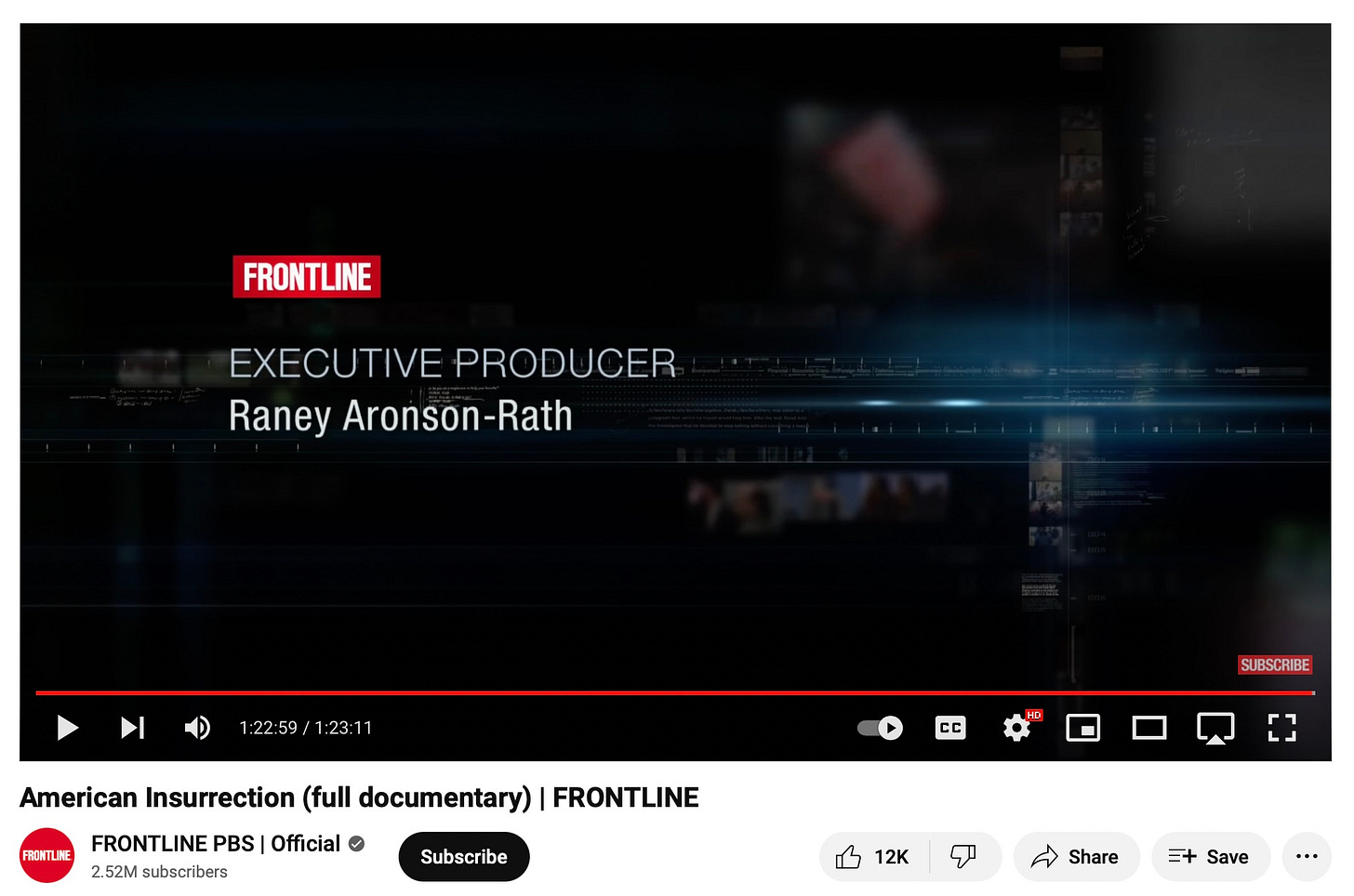

After viewing Audette’s presentation, I composed a new tweet detailing the explicit corruption at PBS Frontline—as he admitted—and showing the direct support for PBS Frontline and Aronson-Rath by Columbia Journalism School and its most senior leadership.
As just one example of this support, I included a link to a video of a January 2019 awards ceremony in which Steve Coll—a Columbia Journalism School faculty member who was then the school’s dean—presented a once-in-a-decade duPont-Columbia “Gold Baton” award to Aronson-Rath for Frontline documentaries that specifically include, among others, “Putin’s Revenge” (Parts I and II). They attack Trump while running cover for establishment Democrats. Interestingly, Audette is credited as the editor in both parts of “Putin’s Revenge,” with Aronson-Rath credited, as usual since 2015, as executive producer.

When announcing the “Gold Baton” award to Aronson-Rath in 2019, then-dean Coll noted to the audience that numerous other awards had been presented by Columbia Journalism School to PBS Frontline in preceding years, calling Frontline “a standard bearer for investigative long-form reporting in the very best traditions of broadcast and documentary filmmaking”—but making no mention of its explicitly corrupt practices.


During Coll’s tenure as dean, Columbia Journalism School began a fellowship program with PBS Frontline that Coll, in 2020, described as “one of the crown jewels of [Columbia Journalism School’s] post-graduate opportunities in public interest reporting.” He also called Frontline, its explicit corruption notwithstanding, “a beacon for the values Columbia Journalism holds highest.” In 2021, Coll reiterated that he is “proud…of the journalism Columbia and Frontline have done together.”

This year, Coll has appeared as an interviewee in a multi-part Frontline documentary titled “America and the Taliban.”

And Columbia Journalism School’s current dean, Jelani Cobb, who assumed his present role at Columbia Journalism School in 2022, is credited as a writer, narrator, and interviewer in a Frontline documentary called “Whose Vote Counts,” which first aired in October 2020, just before the 2020 election. This documentary was also directed by Columbia Journalism School professor and documentary journalism program director June Cross.
Cobb has made numerous defamatory claims about Trump in PBS and Frontline interviews, including in the 2022 Trump-focused Frontline documentary “Lies, Politics, and Democracy,” in which he represents the school on-screen with the chyron “Dean, Columbia Journalism School.”


This past May, in the wake of Trump’s dominant performance in the televised CNN town hall interview (which led to CNN’s dismissal of then-CEO Chris Licht), Coll and Cobb, who are also both staff writers at The New Yorker, recorded a podcast together in which they both puzzled over how to get the better of Trump in an interview.
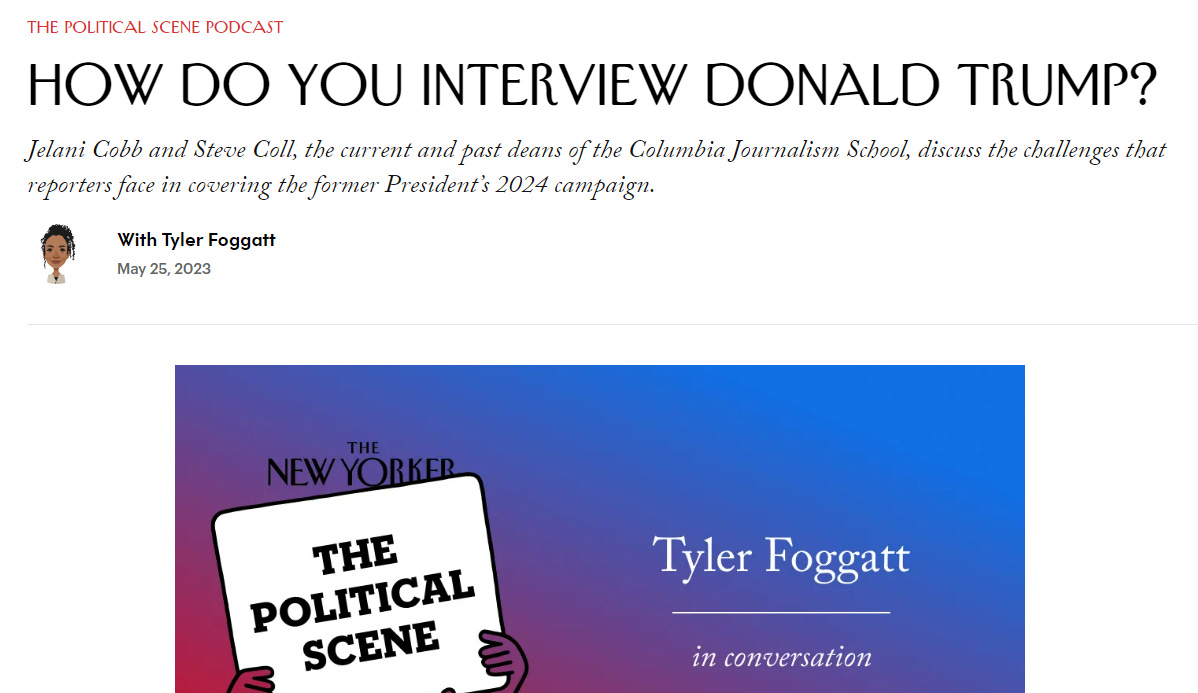
In the podcast, Cobb framed interviews with Trump in adversarial terms, saying, “With someone like Trump, to use the tennis analogy, he’s a grass player who you have to put on clay,” and suggested that journalists should do their best to minimize Trump’s “ability to play to the crowd.”
Coll posited that the easiest way for journalists interviewing Trump to attempt to make news “not of the sort Trump wanted to make” would be to have a one-on-one interview without an audience. He added that an interview with Trump should also not be broadcast live, so that journalists unable to exert a desired level of control over Trump during the interview might be able to effectively cherry pick, edit, and distribute to the public only “the portion of the interview that they believe is newsworthy.”
In response to my tweet detailing Frontline’s explicit, outright corruption, which also references Coll and Columbia Journalism School, Jeff Clark, U.S. Assistant Attorney General from 2018 to 2021, responded (I had addressed the tweet to his attention) with a message that reads:
“Thanks for bringing this to my attention @admolon.
Thanks for highlighting that PBS’s Frontline is completely for sale. (I remember one they did at the start of the Trump Admin about [Administrator of the Environmental Protection Agency from 2017 to 2018] Scott Pruitt—complete hit job and lack of objectivity. Could have been written by Chinese oligarchs hell bent on continuing the Obama Admin’s overregulation, because without those shackles they knew Trump would restore American competitiveness and blossom the fracking revolution to make America energy independent. And you know what? Trump did exactly that.)
[Steve Audette] has no journalistic integrity. He gives a master class in selling out to the Left.
And apparently, it’s been his path to a fortune, since he now brags on his profile he’s retired, sailing up and down the East Coast.
One is tempted to say—“must be nice”—but what really comes to mind is Mark 8:36—“For what shall it profit a man, if he shall gain the whole world, and lose his own soul?”
“Thanks for highlighting that PBS’s Frontline is completely for sale.”
-Jeff Clark, Assistant Attorney General from 2018 to 2021
The writer Sasha Stone messaged me shortly thereafter that she had originally directed now-retired PBS Frontline editor Steve Audette, whom she called her good friend, to my Twitter account because, according to Stone, Audette actually agrees with me about Frontline.
Of course, Audette is now retired after repeatedly attacking Trump and his supporters, including individual Americans who have no established media platforms or followings with which to defend themselves against taxpayer-funded documentaries viewed by millions of people.
Stone wrote to me that Audette has “had an awakening” and that, according to Audette, “Frontline changed after Trump.”
However, Stone wrote that Audette “has to be discreet” about his changed views now because “he has pensions and family, etc.”
I can’t help but wonder if the fellow Americans that Audette, Aronson-Rath, and their colleagues have vilified over and over again in taxpayer-funded Frontline documentaries possess good jobs, substantial pensions, and family support that will allow them to enjoy anything remotely close to a retirement like Audette’s, sailing up and down the East Coast. Many will likely be unable to afford even a basic retirement.
I would also like to know:
How would someone who made an explicit admission of corruption like Audette’s be portrayed in Frontline documentaries, if they were on the wrong side of Frontline staff members’ political bias?
In how many segments and episodes would Frontline staff like Audette and Aronson-Rath gleefully rake such a person over the coals, with footage of an individual admitting anything even faintly comparable to Audette’s smoking gun of a direct quote, “I’ll make you look good, just keep paying me”?

How many scenes playing over and over again with a full complement of dark and dramatic editing effects, while others who had paid Frontline would be made to “look great” in the same documentaries?

Corrupt journalistic practices only undermine trust in the media, which is trusted less and less by the year. According to a Gallup poll from October 2023, 29 percent of U.S. adults have “not very much” trust in media, with a record-high 39 percent having “none at all.” This 68 percent of American adults with not very much or no trust in media compares to a total of only 32 percent who trust the media “a great deal” or “a fair amount.”
This past October, Kyle Pope, in his final column as editor-in-chief of Columbia Journalism Review (CJR)—published by Columbia Journalism School, and with the stated mission of serving as “the intellectual leader in the rapidly changing world of journalism”—felt compelled to return to square one in his attempt to answer the basic question of “why journalism matters,” even in the face of record-low trust in the media.

Pope asks, “If significant numbers of people are never going to believe us anyway, why not move on, and focus on an audience that is more in line with what we have to say?”
He goes on to further reveal his continued bias as editor-in-chief of the purported “most respected voice on press criticism,” whining that despite the establishment media’s best efforts, Trump, whom Pope calls “the anti-democracy candidate,” is “holding his own in most national polls.”
“It’s easy to be demoralized,” Pope writes, before adding, “Our only answer is to keep doing what we’re doing, focusing less on the results of our work and more on the importance of telling the truth to our audience.”

Maintaining journalistic integrity and telling the truth is definitely the right course to take, but it would mean that the establishment media, including PBS Frontline and senior leaders at Columbia Journalism School, would certainly not be able to “continue doing what [they’re] doing,” which entails practicing journalism without fundamental integrity when it comes to covering Trump and his supporters. As polls regarding the media indicate, U.S. news consumers know this very well.
To provide another example of naked bias from once-respected leaders of establishment media organizations, Columbia Journalism School professor and former dean of academic affairs Bill Grueskin, who contributes to the Columbia Journalism Review and has regularly posted anti-Trump tweets, tweeted the day after the 2018 midterm elections, in reference to the politically motivated Mueller special counsel investigation of Trump, “This would be an appropriate moment for Mueller to drop a few indictments.”

Later, among numerous other anti-Trump tweets, he celebrated President Trump’s suspension from Twitter in January 2021.
Grueskin also notably mocked Bari Weiss in the run-up to and aftermath of her resignation from the New York Times as an opinion writer and editor.
Weiss resigned from the Times in 2020, due to what she called an “illiberal environment” and “bullying by colleagues” at the newspaper. Describing the environment at the Times, Weiss wrote in her resignation letter:
“Why edit something challenging to our readers, or write something bold only to go through the numbing process of making it ideologically kosher, when we can assure ourselves of job security (and clicks) by publishing our 4000th op-ed arguing that Donald Trump is a unique danger to the country and the world? And so self-censorship has become the norm.”
In October 2021, I questioned Grueskin, via the Facebook group for Columbia Journalism School students and alumni, about a new tweet he had made citing Trump’s letter to the Pulitzer Prizes—administered by Columbia Journalism School—in which Trump calls on the Pulitzer Prize Board to “rescind the 2018 Pulitzer Prize for National Reporting awarded to the staffs of The New York Times and The Washington Post, which was based on false reporting of a non-existent link between the Kremlin and the Trump Campaign.”
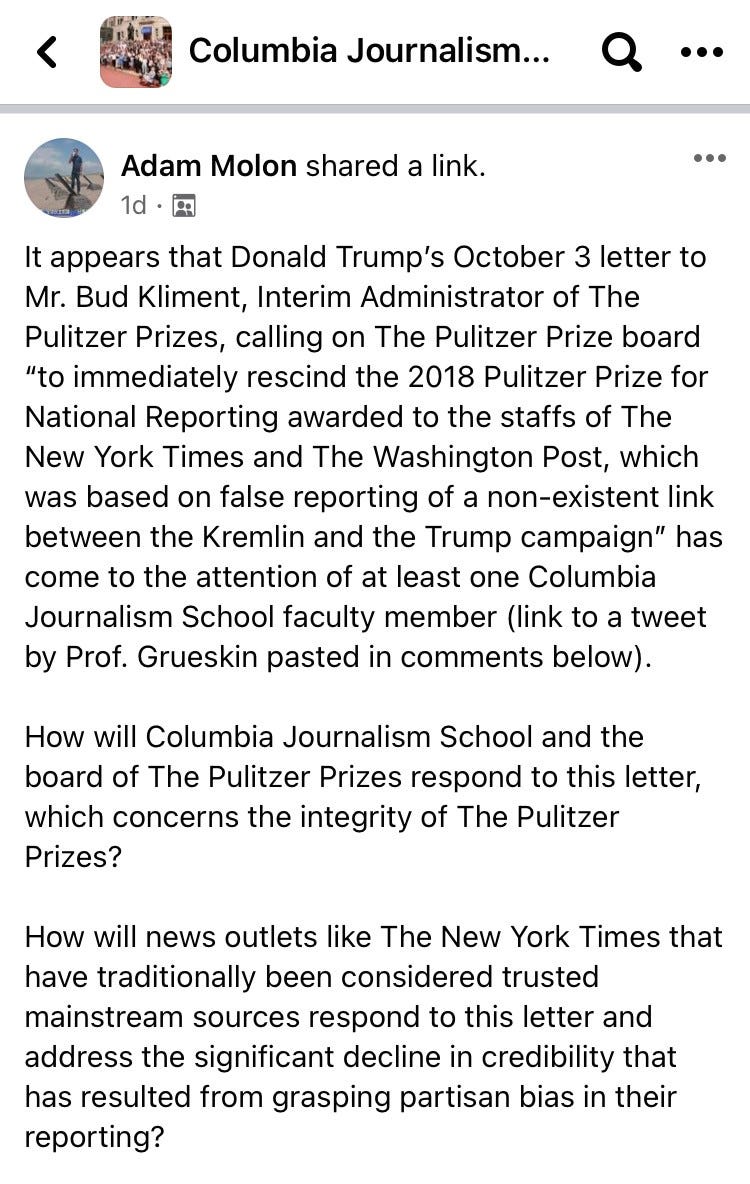
Shortly after I questioned Grueskin in front of thousands of alumni, students, and faculty members in the Columbia Journalism School Facebook group, his tweet referencing Trump’s letter was deleted with no explanation.
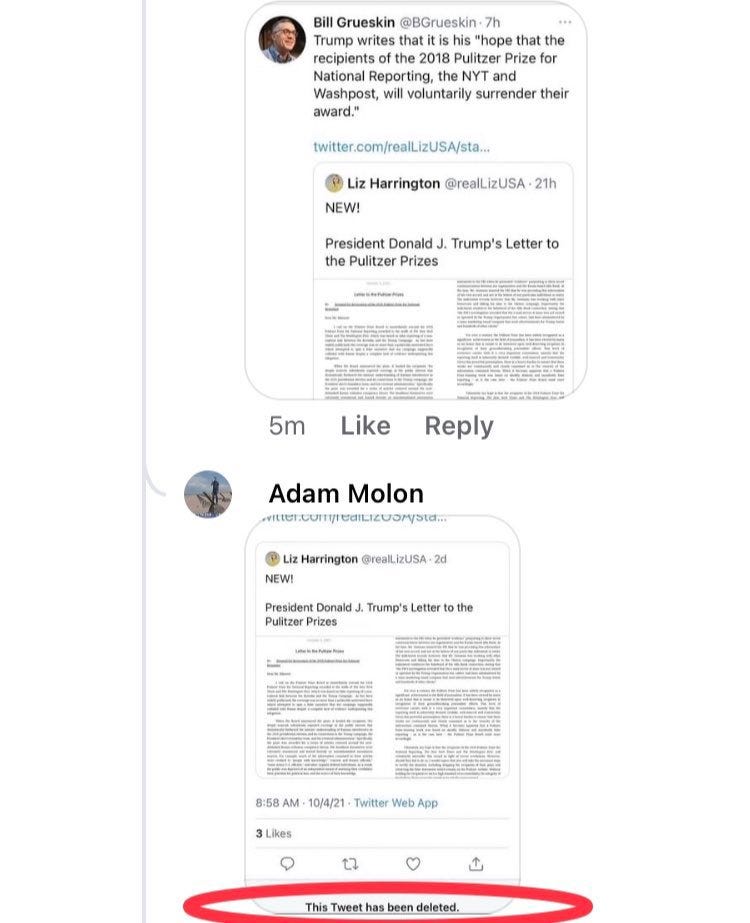
Following additional pressure from alumni in the Facebook group, Grueskin made an evasive non-response to the group, in which he completely avoided the main issue at hand—the 2018 Pulitzer Prize award to the Washington Post and the New York Times. He instead focused on trying to explain the deletion of his related tweet.


Follow-up questions that I asked went unanswered.
Grueskin’s follies continued after it was announced in October 2021 that Steve Coll would be stepping down as dean of Columbia Journalism School in June 2022. Grueskin had been publicly passed over for the school’s deanship in 2013 in favor of Coll, and with Columbia Journalism School’s next dean to be selected within the following months and Columbia Journalism School alumni and faculty now very aware of Grueskin’s demonstrated bias—thanks in part to my questioning of him regarding his Pulitzer Prize tweet—he made an apparent strategic attempt at damage control. Grueskin published a full-length op-ed in the New York Times the following month, titled, “How Did So Much of the Media Get the Steele Dossier So Wrong?”
In the op-ed, Grueskin addressed the infamous Steele dossier, which he acknowledged inspired “a slew of juicy, and often thinly sourced, articles and commentaries about Mr. Trump and Russia.” However, he made no mention whatsoever of the 2018 Russia-related Pulitzer Prize that he had tweeted about the month before and which was administered by Columbia Journalism School (or of his own anti-Trumpism).

When Grueskin’s November 2021 op-ed was published, Irena Choi Stern, a former assistant dean for alumni relations—seemingly allied with Grueskin and overcompensating with an obvious attempt to run cover for him—rushed a post with a link to the piece to the Columbia Journalism School Facebook group with the comment, “Terrific Op-Ed by the always fair and balanced Bill Grueskin.”

Despite his apparent maneuvering to regain credibility, Grueskin nonetheless continued to embarrass the school very publicly on Twitter, including through a spat he initiated with journalist Michael Tracey in March 2022 that ended with another tweet deletion by Grueskin.
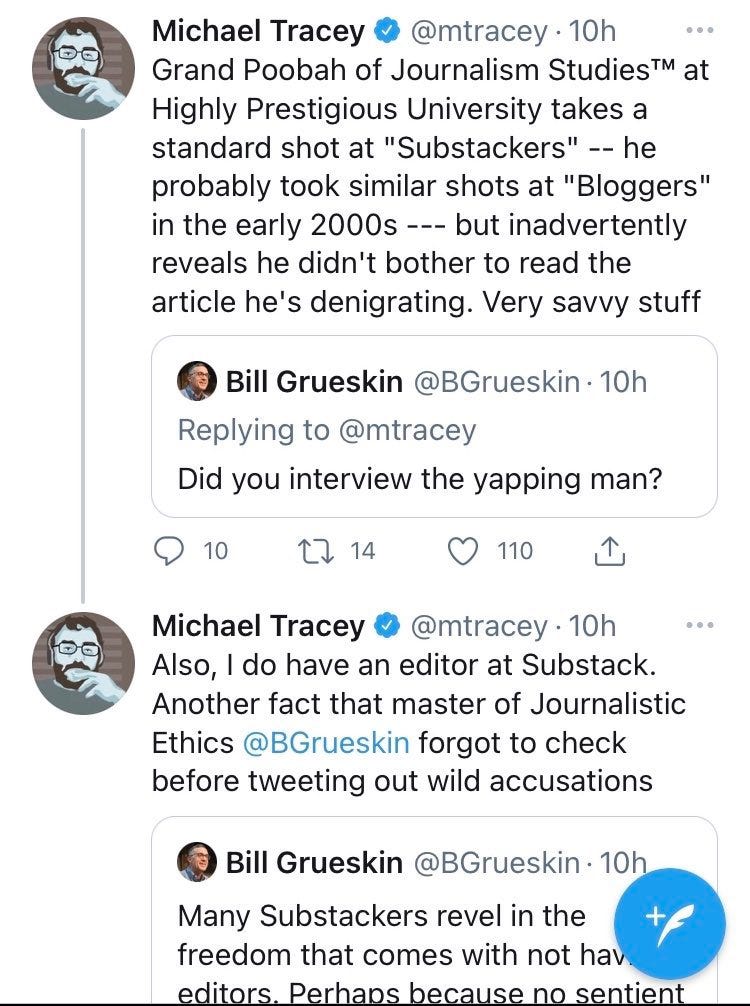

And he was again not chosen as Columbia Journalism School’s new dean in 2022. A dramatic change to Grueskin’s Twitter account profile photo and concerning tweets followed soon after. These tweets focused on his repeated unsuccessful attempts to be granted a blue check by Twitter under its legacy verification system because he did not meet Twitter’s “criteria for notability.”
Grueskin, who was dean of academic affairs (not overall dean of the school) when I entered Columbia Journalism School, had delivered one of the first addresses to my class when we began our studies, and Coll was the new dean of the school when I graduated with an M.S. in Journalism from Columbia in 2013. It is disillusioning, to put it mildly, that I have to focus on the important work of holding Columbia Journalism School and its so-called leaders—including some of my professors—accountable with respect to journalistic integrity.
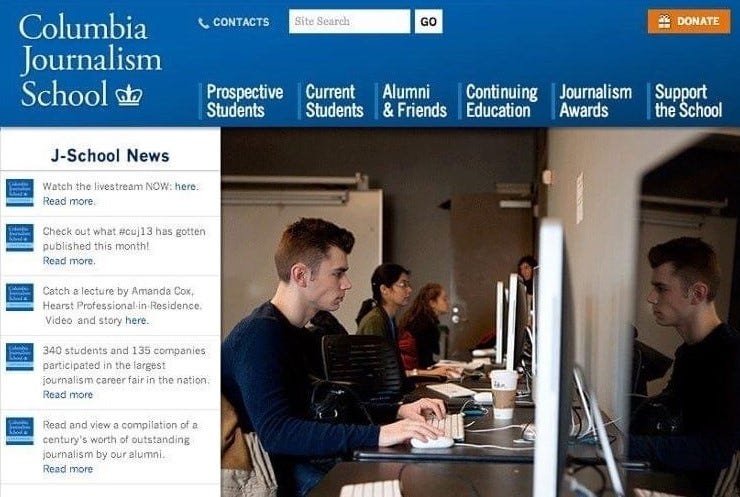
Yet so few have had the courage to do so, even as the Columbia Journalism Review bemoans “record-low trust in the media” while coming to the bankrupt conclusion that their “only answer is to keep doing what we’re doing.” As Sasha Stone notes in her piece “The Day Journalism Died,” it is now often “left to podcasters and outsider media to do the job the mainstream media cannot and will not.”
Since early 2021, I have brought numerous, clear, and concrete examples of Columbia Journalism School’s lack of integrity, including the facts I have detailed in this piece, to the attention of faculty members, alumni, and students via published work, Twitter, Facebook, and LinkedIn, but have so far seen no meaningful response or movement toward fundamental reform at the school. If Columbia Journalism School were to make substantive moves toward integrity through the efforts of courageous alumni, faculty members, and students, this would have great significance for journalism, as the school has traditionally been seen as a leader and standard setter in the field. Alas, Columbia Journalism School is failing miserably.
The broader continuing failure of establishment media—borne out in public polls and enabled by the vacuum of honorable leadership at Columbia Journalism School—is also obvious. Journalists and editors at establishment outlets need to find the strength to right their ships and steer toward integrity if they wish to hang onto rapidly fading, if not already relinquished, places of leadership in the field.
PBS Frontline executive producer Raney Aronson-Rath has a pet phrase that she repeatedly recites during media appearances: “Corruption doesn’t show its face.” In a 2016 Forbes interview, Aronson-Rath stated, “As I often say, corruption doesn’t show its face—so we will be there to expose wrongdoing and hold governments and corporations accountable for their actions.” In a 2020 interview with the Baltimore Sun, she repeated, “I always like to say at Frontline that corruption doesn’t show its face. So, corruption can run wild if there aren’t journalists on the case.”
“Corruption doesn’t just show its face,” Aronson-Rath stated during a fawning September 2023 podcast interview in which she, Frontline, and Columbia Journalism School were portrayed as being part of the solution, rather than the problem. She was interviewed together with Columbia Journalism School documentary journalism program director June Cross for the podcast. And of course, Aronson-Rath didn’t mention during the interview that Frontline’s explicit corruption had been publicly exposed by my and former Assistant Attorney General Jeff Clark’s Twitter/X posts in August, only a month prior.
“Corruption doesn’t just show its face.”
-PBS Frontline executive producer Raney Aronson-Rath, during a September 2023 interview
Columbia Journalism School’s Twitter/X account promoted the podcast in a post that included Aronson-Rath’s Twitter/X handle and encouraged followers to “listen now.”
Responding to it, I noted that:
“There is ‘diminished trust in the news media’ (a huge understatement) because taxpayer-funded [PBS Frontline] under executive producer [Raney Aronson-Rath] is explicitly corrupt.
…Complicit and recently retired Frontline editor [Steve Audette] has inside information to stop this, but has done nothing. No longer surprising that [Columbia Journalism School] is promoting this [podcast interview, effectively running cover for Aronson-Rath and Frontline].”
When Aronson-Rath tweeted in early October that Frontline “is looking for the next great story” and is “particularly interested in projects about elections, democracy, and voting as we head into the 2024 election year,” I responded that:
“I nominate [Steve Audette] to take a break from boating and complete an in-depth, insider’s exposé of the explicit corruption of [PBS Frontline] under Aronson’s leadership and the support of this corruption by Columbia Journalism School.”
I continued with more specific detail about questions that should be answered.


Rather than respond directly to my tweet—which was addressed to him, among others—Audette instead “liked,” shortly thereafter, the tweet that I have pinned to my Twitter/X profile, which is a note of thanks to Dr. Peter Navarro, who tweeted out a piece I wrote and published in 2021. This piece, titled “Dispatch From Quemoy: My Journey to the Front Lines of Freedom,” is my personal origin story.

Was this “like” of my pinned tweet by Audette, instead of directly addressing my call to action, an attempt to avoid accountability? Or will Audette, who worked at PBS Frontline for decades, finally do the right thing and make real, publicly visible efforts to stop the damage that Frontline’s demonstrated bias and explicit corruption continues to do to the United States and the American people?
Decisions like this across numerous public and private journalistic organizations, including Columbia Journalism School, will be integral to the future success of the United States as a nation. It will be crucial for the restoration of credibility and long-term viability of journalism outlets that currently comprise the old guard establishment.
In the meantime, as the new guard, let’s demand full accountability at PBS Frontline and Columbia Journalism School until it is delivered. When tax dollars are at stake, Americans deserve nothing less.











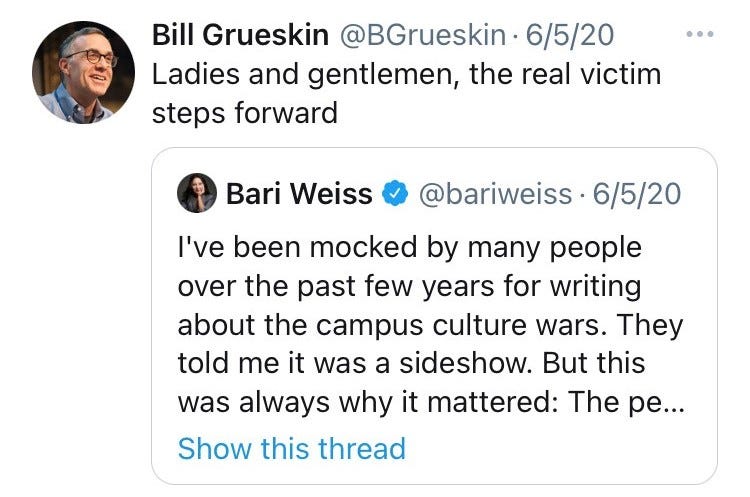

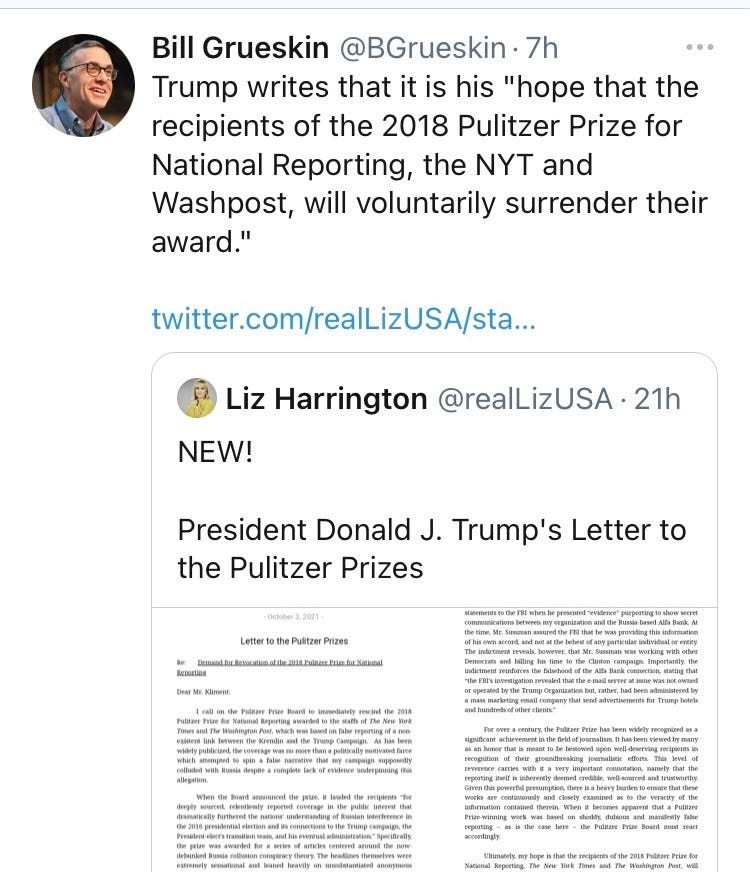
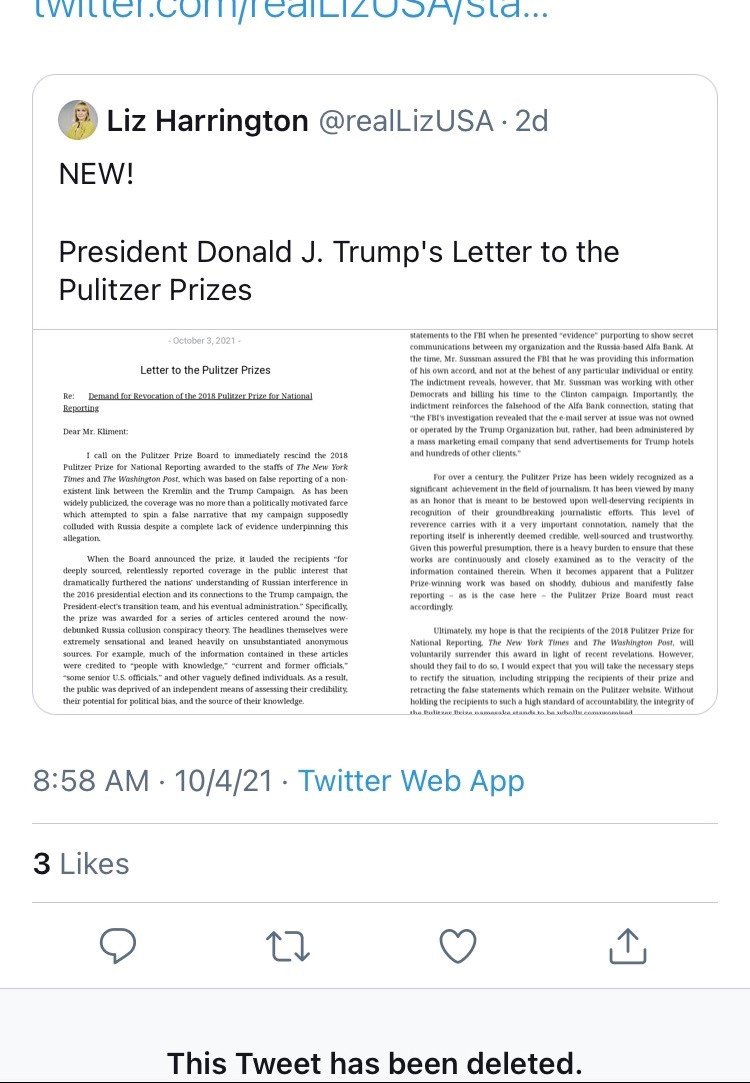



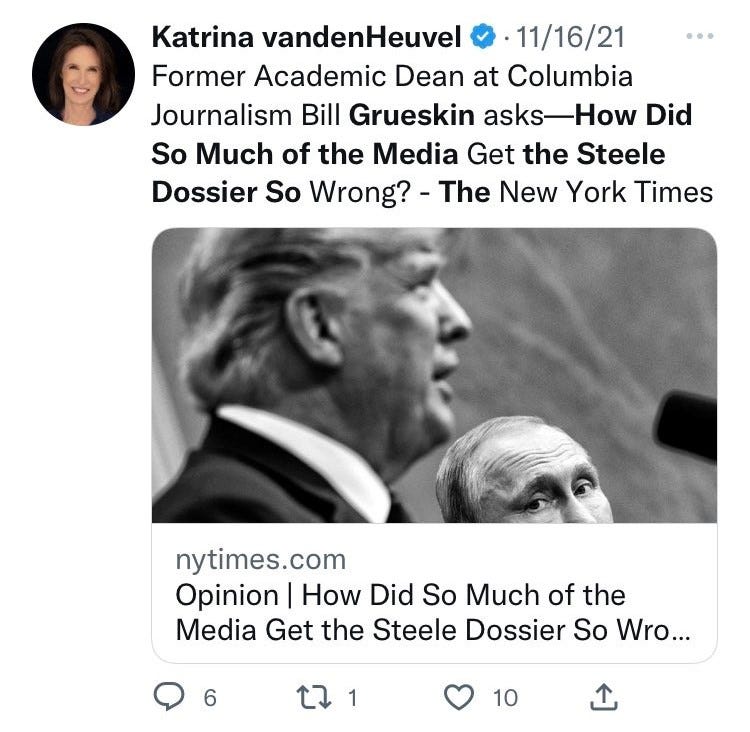


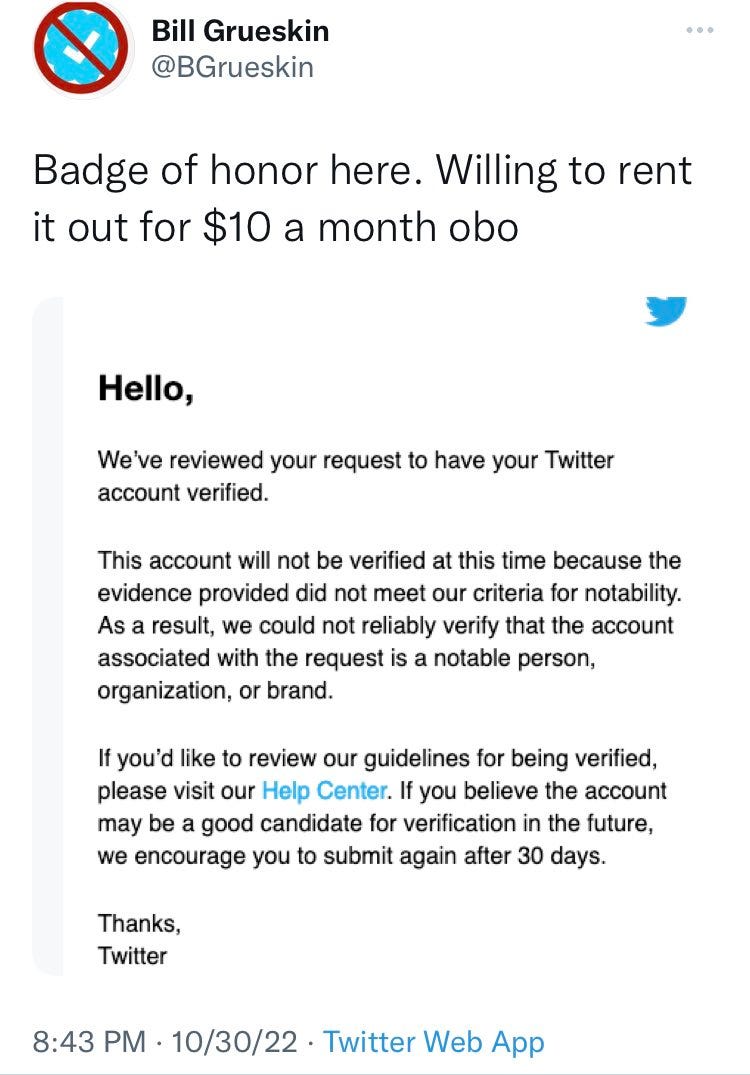



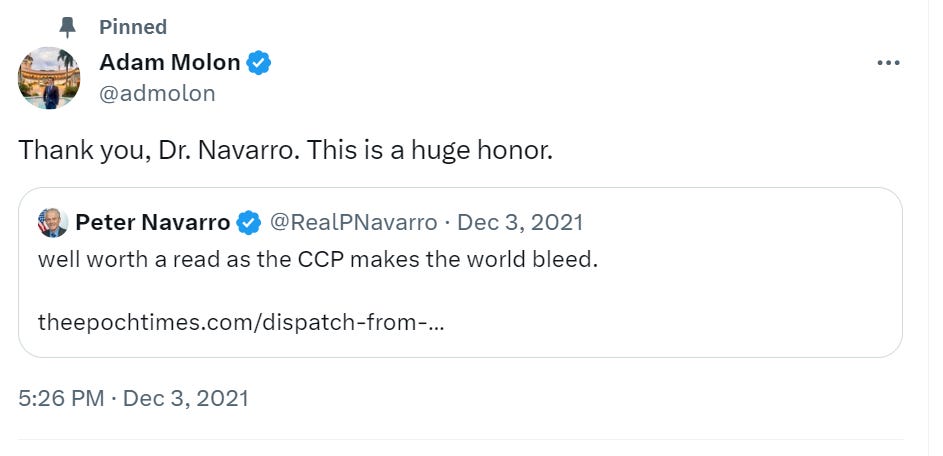
"Or will Audette, who worked at PBS Frontline for decades, finally do the right thing...?"
Not in a million years. (But probably *would* do it for far less than a million dollars.)
These people are disgusting. "Notability" is far from the biggest thing lacking in any of them. They willingly (with pride, even) admit (boast) that they are absolutely for sale, that they will betray any person or principle, manipulate, reframe, fabricate and straight up lie for money, "notability", political or personal belonging - whatever reason they see fit, and they're surprised that 70% of the public views them with contempt. But the biggest lies are reserved for what they tell themselves - they're the "good guys". Giving themselves awards, log-rolling social media posts, sad little pats-on-the-back, all the while pretending that "journalism" is still a noble profession.